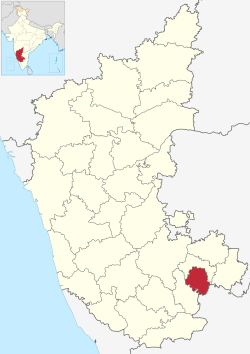Bengaluru Urban district
|
Bengaluru Urban district ಬೆಂಗಳೂರು ನಗರ ಜಿಲ್ಲೆ |
|
|---|---|
| District | |

Bangalore Palace
|
|
 Location in Karnataka |
|
| Coordinates: 12°58′13″N 77°33′37″E / 12.970214°N 77.56029°ECoordinates: 12°58′13″N 77°33′37″E / 12.970214°N 77.56029°E | |
| Country |
|
| State | Karnataka |
| Headquarters | Bengaluru city |
| Talukas | Bengaluru Uttara, Bengaluru Dakshina, Bengaluru Purva |
| Government | |
| • Deputy Commissioner | V. Shankar, I.A.S |
| Languages | |
| • Official | Kannada |
| Time zone | IST (UTC+5:30) |
| Vehicle registration |
|
Bengaluru Urban is a district of the Indian state of Karnataka. It is surrounded by the Bengaluru Rural district on the east and north, the Ramanagara district on the west and the Krishnagiri district of Tamil Nadu on the south. Bengaluru Urban district came into being in 1986, with the partition of the erstwhile Bengaluru into Bengaluru Urban and Bengaluru Rural districts. Bengaluru Urban has four taluks: Bengaluru North, Bengaluru East, Bengaluru South and Anekal. The city of Bengaluru is situated in the Bengaluru Urban district. The Bengaluru Urban district has 17 hoblies, 668 villages and 9 municipal corporations. Electronics City the pride of India and hub of Bengaluru's Information Technology companies is situated in Anekal Taluk.
This is the most advanced district in Karnataka. It had a population of 6,537,124 of which 88.11% is urban as of 2001. As of Census 2011, its population has increased to 9,588,910, with a sex-ratio of 908 females/males, the lowest in the state and its density is 4,378 people per square km.
The climate here is moderate. In summer it receives a good amount of sunlight. In winter it is not very cold. The lowest average temperature here is about 16–18 °C (61–64 °F).
According to the 2011 census Bengaluru Urban district has a population of 9,588,910, roughly equal to the nation of Belarus or the US state of North Carolina. This gives it a ranking of 3rd in India (out of a total of 640). The district has a population density of 4,378 inhabitants per square kilometre (11,340/sq mi) . Its population growth rate over the decade 2001-2011 was 46.68%. Bangalore has a sex ratio of 908 females for every 1000 males, and a literacy rate of 88.48%.
...
Wikipedia
